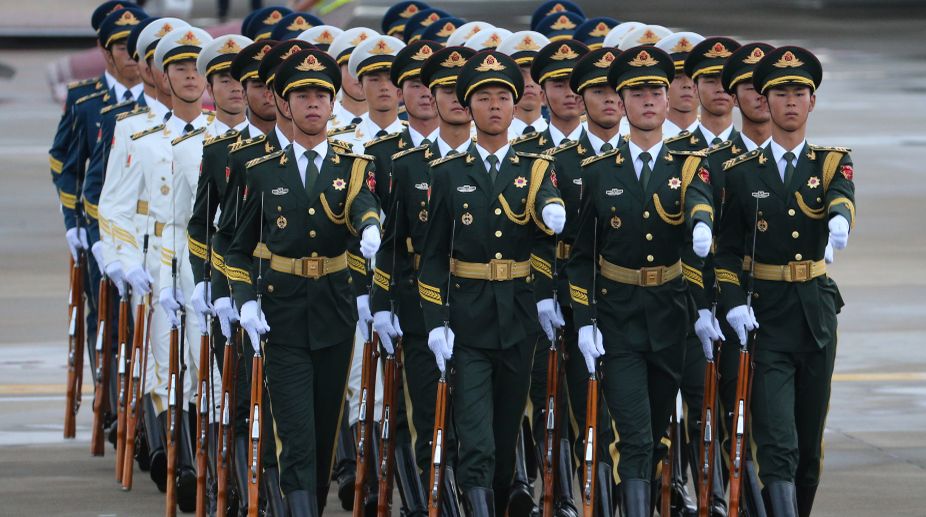Still unexplained
The hunt for the origins of Covid-19 has for the past four years been a tangled web of politics, power struggles, and international finger-pointing.

(Photo: AFP)
China fought its last war in 1979 against Vietnam. But it wasn’t an unqualified success because Hanoi gave back as good as it got.
India fought its last war in 1971 ~ Kargil in 1999 was no more than a border skirmish ~ and it was quite a triumph since India succeeded in cutting its adversary, Pakistan, into two. It needs to be said, however, that both the 1979 and 1971 wars were not in the same league as the worldwide conflicts of the mid-20th century which were fought in land, air and sea and lasted for half a decade.
By that token, both China and India were spared the trauma of a prolonged warfare in the recent past. This may be the reason why China hasn’t hesitated in the matter of provoking a perceived enemy ever since it was able to overcome the disastrous events in the aftermath of the Communist takeover of the country when it experienced famine and an internal power struggle exemplified in the cultural revolution and the flight and the death in an air crash of Lin Biao, a challenger to the Great Helmsman, Mao Zedong.
Advertisement
Having emerged from those near-apocalyptic events to become a powerful economic and military power, China is now seemingly bent on letting the world know about its strength.
Not surprisingly, it has been targeting India if only because the latter poses, more than any of China’s other neighbours, a political threat by being a democracy in contrast to China’s one-party dictatorship (which doesn’t earn it much international respect) and a nuclear power whose military prowess, though not as formidable as China’s, is not negligible.
China has appeared keen, therefore, to test India’s resolve by, first, doing away with the 2005 agreement not to disturb areas where there are “settled populations” and, secondly, via incursions along various points along the 4,057 km border between the two countries. Doklam in the trijunction of India, Bhutan and China saw the latest of these intrusions. But it may well turn out to be one of the last because China has realized that India has decided to take it on frontally even at the risk of a war.
It is possible that 20 or 30 years earlier, China would not have minded a short, sharp war as in 1962. Hence, perhaps, the repeated references to that year in its bellicose semi-official communiques during the Doklam standoff.
The Chinese probably believed that India would take fright at the possibility of being “vaporised”, as the Chinese media threatened. But when this did not happen and India remained cool and unperturbed, Beijing apparently lost the plot because it realized that a war is inadvisable in the present era of trade.
Its dilemma was all the greater because it knew that even a short, sharp war would undermine its vaunted Belt and Road Initiative (BRI) in the South Asia region and perhaps elsewhere as well because the conflict would show up China’s reckless belligerence which would be out of sync with commercial enterprises. It is evident that projects like the BRI and the emphasis on trade as a result of globalization have had a dampening effect on warmongers.
North Korea is an exception because of its closed economy. But since nearly all the countries are now interlinked in myriad ways through trade and commerce, none of them is eager for a major disruptive misadventure. Neither is China.
All that it wants to do at present is seemingly to throw its weight around so that the others will simply back off, whether in the South China Sea or in South Asia. But for all its sabre-rattling, it is unlikely to opt for war.
The fallout of this compulsive recourse to restraint on China’s part is that India can breathe easy since even there are more Doklamtype provocations, as the Indian army chief, Gen. Bipin Rawat, has warned, the chances of a war are minimal.
At the same time, it will be unrealistic to expect that China will opt for a harmonious settlement of the border question since it will be difficult for it to pull back after having ratcheted up its demand like the one for the virtual annexation of Arunachal Pradesh, which China calls southern Tibet. Besides, war or no war, China is scared about being seen as a country which has thrown in the towel.
A dictatorship simply cannot afford to be seen as being weak lest it encourages its captive population to demand a greater say in governance. Indeed, the present de-escalation of the crisis in Doklam is bad news for President Xi Jinping on the eve of the party congress, for the lowering of the tension with India and Bhutan has scuttled his plans for posing as the new Mao.
This explains why China says that it is continuing to exercise its “sovereign rights” in Doklam and may even restart the project of building the road ~ if weather permits ! ~ which has been put on hold in the aftermath of the entry of the Indian troops into the plateau.
(The writer is a former Assistant Editor, The Statesman)
Advertisement